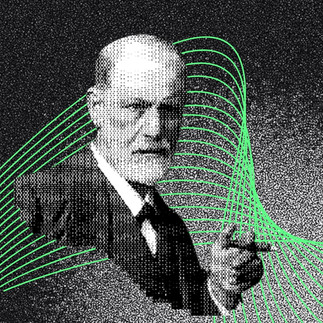Fundamental Concepts in Science: a short commentary on the vision of Freud and Keynes
- Maria Vittoria Ceschi
- Sep 6, 2023
- 3 min read

We inaugurate this project, called metaeconomica, with two quotes in comparison: one from S. Freud and the other from J.M. Keynes. Both speak of the fundamental concepts of science: psychoanalysis and economics, respectively. It is precisely these foundations that metaeconomica wants to analyze at the clearing of the exchange of knowledge. How can psychoanalysis shed new light on economics? How can economics, in turn, provide new data to psychoanalysis applied to the social? Metaeconomica, therefore, stands between the fault lines that separate economics and psychology from a new and third perspective, namely metapsychology, to create the bridge needed for a true integration of the sciences.
Fundamental concepts in Instincts and their Vicissitudes
In the following quote taken from Instincts and their vicissitudes, Freud talks about the fundamental concepts of science, how they are built and how they develop. Freud gives one of the sharpest descriptions of the "beginning of the scientific activity" and its evolution. From the quote, we can also appreciate the abductive reasoning (in the sense of Charles Sanders Peirce) as the driver for scientific investigation.
Wir haben oftmals die Forderung vertreten gehört, daß eine Wissenschaft über klaren und scharf definierten Grundbegriffen aufgebaut sein soll. In Wirklichkeit beginnt keine Wissenschaft mit solchen Definitionen, auch die exaktesten nicht. Der richtige Anfang der wissenschaftlichen Tätigkeit besteht vielmehr in der Beschreibung von Erscheinungen, die dann weiterhin gruppiert, angeordnet und in Zusammenhänge eingetragen werden.
S. Freud, Triebe und Triebschicksale.
Translation and extensive version in the Standard Edition:
We have often heard it maintained that sciences should be built up on clear and sharply defined basic concepts. In actual fact no science, not even the most exact, begins with such definitions. The true beginning of scientific activity consists rather in describing phenomena and then in proceeding to group, classify and correlate them. Even at the stage of description it is not possible to avoid applying certain abstract ideas to the material in hand, ideas derived from somewhere or other but certainly not from the new observations alone. Such ideas - which will later become the basic concepts of the science - are still more indispensable as the material is further worked over. They must at first necessarily possess some degree of indefiniteness; there can be no question of any clear delimitation of their content. So long as they remain in this condition, we come to an understanding about their meaning by making repeated references to the material of observation from which they appear to have been derived, but upon which, in fact, they have been imposed. Thus, strictly speaking, they are in the nature of conventions - although everything depends on their not being arbitrarily chosen but determined by their having significant relations to the empirical material, relations that we seem to sense before we can clearly recognize and demonstrate them. It is only after more thorough investigation of the field of observation that we are able to formulate its basic scientific concepts with increased precision, and progressively so to modify them that they become serviceable and consistent over a wide area. Then, indeed, the time may have come to confine them in definitions. The advance of knowledge, however, does'not tolerate any rigidity even in definitions. Physics furnishes an excellent illustration of the way in which even 'basic concepts' that have been established in the form of definitions are constantly being altered in their content.
S. Freud, Instincts and their vicissitudes, Standard Edition vol 14, p. 117
Fundamental concepts in The Choice of Units
The three perplexities which most impeded my progress in writing this book, so that I could not express myself conveniently until I found some solutions for them, are: firstly, the choice of the units of quantity appropriate to the problems of the economic system as a whole; secondly, the part played by expectation in economic analysis; and thirdly, the definition of income.
J.M. Keynes, The General Theory of Employment, The Choice of Units
This is an extract taken from Chapter 4 of the General Theory, named "The Choice of Units". In here, Keynes is occupied "with an attempt to clear up certain perplexities" arond some specific methodological issues: 1) choice of units 2) role of expectations 3) definition of income. This propedeutical work is for Keynes extremely important as it clears up the space for his investigations, a space that "it does not happen to have been already treated elsewhere in a way which I find adequate to the needs of my own particular enquiry". As his work was very critical to the orthodox economics of the time, Keynes was faced with the necessity to start from the fundamentals. These theoretical fundamentals would serve at a later stage the "application of this theory to practice", as he puts in the Preface of the General Theory.






















Comentarios